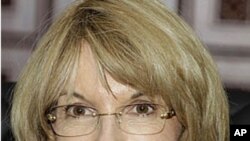The head of the United Nations’ Office of Legal Affairs wrapped up her visit to Cambodia’s troubled Khmer Rouge tribunal on Friday with strong words for the Cambodian government, which has long spoken out against two of the court’s investigations. But there was no mention of whether the U.N. would investigate the conduct of one of the court’s key offices that has been criticized by observers and survivors.
Patricia O’Brien’s visit to Phnom Penh came after German investigating judge Siegfried Blunk quit earlier this month citing political interference.
Late Thursday O’Brien said she had strongly urged Phnom Penh to stop making statements opposing the progress of two of the four main cases, known as Case 003 and 004. She also called for authorities to refrain from interfering in any way with the judicial process and reminded the government that it is obliged to cooperate fully with the tribunal.
Over the past year Cambodian ministers have publicly spoken out against the court’s final two cases.
Ou Virak, the president of the Cambodian Center for Human Rights (CCHR), and a survivor of the Khmer Rouge, which killed his father welcomed O’Brien’s statement - in part.
“I thought the statement was concise enough, but my problem with it is that it referred to political statements by the government, by government officials. I think it doesn’t go far enough," he said. "We need to make sure that the U.N. is pushing for complete independence of the court, and therefore not just statements being made public, but any sign of interference by the government should be unacceptable - and that to me is what was missing.”
Court observers and survivor groups have criticized the conduct of the tribunal in recent months, arguing that judges were politically pressured to undermine their investigations into Cases 003 and 004.
O’Brien’s statement did not mention whether the United Nations would investigate what had occurred at the Office of the Co-Investigating Judges - the arm of the court lead by Blunk and his Cambodian counterpart You Bunleng.
Ou Virak, the president of the Cambodian Center for Human Rights (CCHR), is among those who have called for an independent investigation.
He said he and other Cambodian observers met with O’Brien on Friday and told the U.N. legal chief that the court must build public confidence.
“The court needs to provide this confidence by properly investigating, by putting into place the necessary mechanism to ensure there’s no such things in the future. But the problem is they have to address all these allegations including the allegation I think made lately by the resignation of Judge Blunk,” Oy said.
Virak said he was not encouraged by O'brien’s willingness to order a probe.
Instead, he says, the conversation from the U.N. side focused on reasons not to investigate.
U.N. spokesman Lars Olsen said Friday that O’Brien had gathered information so that the U.N. can decide “what action, if any, would be appropriate.”
Earlier this week the tribunal announced that Case 002, against the four surviving leaders of the Khmer Rouge, would start in late November.
And on Thursday the court heard arguments over whether defendant Ieng Thirith, the former social affairs minister, is fit to strand trial.
Medical experts say Ieng Thirith has dementia, and her legal team says she is not fit for trial. That is opposed by the prosecution and lawyers for civil parties.
The tribunal is expected to rule on Ieng Thirith’s fitness for trial in the coming weeks.
UN Legal Chief Wraps Up Visit to Cambodia’s Tribunal













